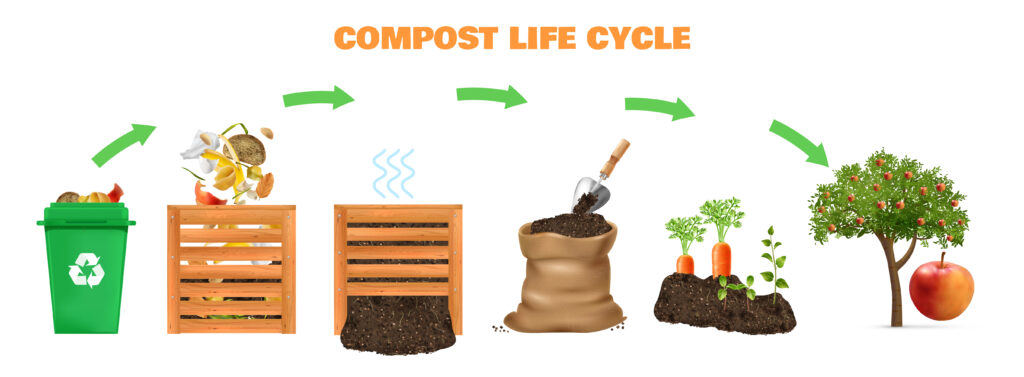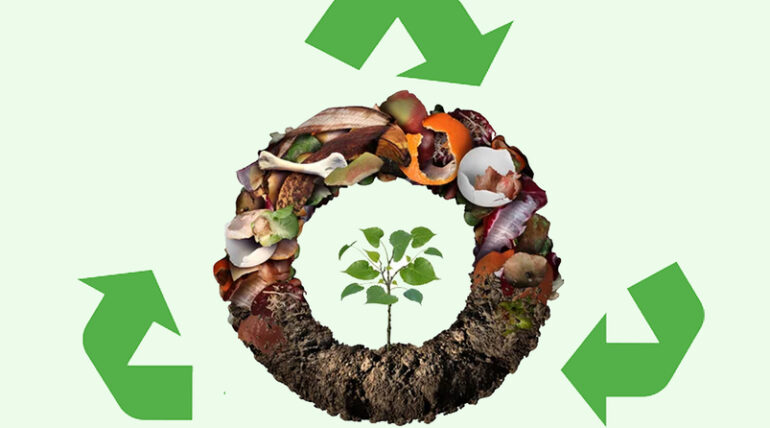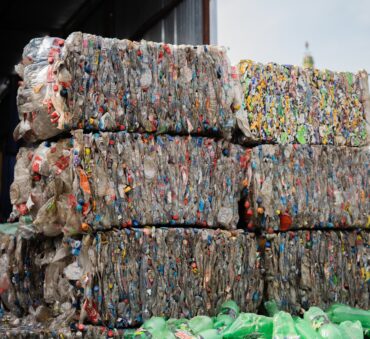Achieving sustainable waste management solutions for your business is as easy as leaving your green footprint on black gold. Composting is a natural process where food and organic materials naturally break down and, in turn, improve soil quality. Consider composting for businesses to alleviate the amount of waste and impact your company has had on the environment. You will also be giving back for a more sustainable future.
In this article, Shapiro, experts in waste management, will answer questions relating to composting. From the basics of “Is composting recycling?” to “How to implement composting in your business?”. We will explain the process, its positive impact on the environment, and how this can benefit your company’s goals in achieving sustainability.
What is composting?
Composting is nature’s way of recycling. In other words, It breaks down organic waste naturally, turning it into nutrient-rich organic soil amendments to improve soil health and support plant growth. Organic waste is any biodegradable material. Some examples of organic waste include food wastage, such as food scraps and scraps from food production).
What is the composting process?
Composting is the process of breaking down organic waste naturally. Organic waste breakdown occurs through aerobic decomposition. Unlike anaerobic decomposition, it uses oxygen, essential for microorganisms like bacteria, fungi, or worms, to break down organic materials.
During composting, microorganisms also need carbon as an energy source and nitrogen to build proteins and reproduce. Balancing the carbon-to-nitrogen (C: N) ratio is crucial to ensure that the organic matter breakdown efficiently produces nutrient-rich compost. In composting, the ideal ratio is 20-30 parts carbon to 1 part nitrogen. Suppose the ratio is too high (more carbon than nitrogen), the microorganisms will not have enough nitrogen to reproduce and break down the organic materials, and this causes the composting process to slow down and affect the compost itself.

On the other hand, if the C: N ratio is too low (more nitrogen than carbon), the compost pile will become too wet and hot, resulting in an unpleasant ammonia odor or even leading to nitrogen toxicity.
The above are all critical factors in the composting process. The quality of the final compost turns it into nutrient-rich organic soil amendments for sustainable efforts such as agricultural, farm and land application. One great example of these materials is biochar.
The benefits of composting for businesses
Composting in the office includes benefits such as reducing waste disposal and water usage costs. This form of waste management is cost-effective and reduces your business’s carbon footprint, promotes sustainability, and reduces the amount of waste that goes into landfills. According to EPA, they prefer composting waste over landfill disposal.
Another benefit for your business is to convert organic food waste into compost, which in turn is used to grow the next generation of crops. From an agricultural perspective, composting is a very important element of any farm waste management plan. It produces higher yields of crops, which benefits farmers and local businesses alike.
By implementing composting in the office, you can increase your business’s sustainability goals and positively impact the environment. In other words, it will help producing healthy soil, removing the need to use chemical fertilizers to conserve natural resources (such as trees, plants, and water).
Composting is also a great way to help combat food waste problems, like climate change. Using commercial composting to eliminate your organic waste helps reduce greenhouse gas emissions such as methane, commonly developed in waste landfills.
How to implement composting in your business
To implement composting in your business, there are a few steps that you need to consider:
- Start with performing a waste audit for your business to assess your organic waste stream and determine the amount and types of waste your business generates.
- Identify composting materials your company produces, including food waste from the cafeteria, coffee grounds, or tea bags.
- Estimate your waste volume per employee and the organization (this estimation includes considering purchasing materials that can, after use, be considered organic waste. By estimating your waste volumes, your business can identify the composting capacity and plan for future growth should you need to expand your composting capacity.
Examples of commercial composting solutions
Once you establish a preliminary report, the next step is to pick organic waste composter solution. There are a few options that you can choose from:
- On-site composting options include implementing composting bins: The size of the composting bins may vary in size of your company and the amount of organic waste. These bins can either be indoor bins or outdoors to accommodate the different organic waste (an indoor bin can accommodate all paper materials while outside bins can cater to food wastage.
- Vermicomposting is another option as it’s a faster process and produces quality soil with fewer odors. It makes it an excellent choice for companies to consider indoors and outdoors. Worms typically used for composting include earthworms and red wigglers, both known to consume large portions of organic waste to produce vermicompost
- Aerated static pile composting is a waste management method that uses bulking agents to layer between the organic waste, allowing air to travel up from the bottom to maintain aerated conditions for the microorganisms that break down the organic waste. This composting method is fast and efficient while producing fewer odors as well.
- In-vessel composting, systems can handle larger volumes of organic waste. Therefore, it can be ideal for larger businesses that generate significant waste. In-vessel composting is placing a wide variety of organic waste in a sealed container (preventing odors and greenhouse gasses from escaping). Air is pumped into the container to maintain aerobic conditions and provide oxygen for the microorganisms that break down the organic waste. Although these containers are sealed, the composting process is monitored closely by adjusting temperature and moisture levels and turning the materials periodically as needed to ensure optimal conditions for decomposition.
Off-site solutions: commercial composting partner
Suppose you cannot implement recycling efforts internally. Contributing factors might be limited space and resources or a lack of budget to invest in expensive composting equipment and infrastructure. In that case, you should consider an off-site solution.
We recommend teaming up with a composting company. It will help collect the organic waste that your business has generated and transport it to a composting facility. This solution takes the maintenance and monitoring of the composting process off of your plate.
Shapiro is a trusted composting service partner, offering expert services for food waste recycling, composting and biochar solutions.
Baily Ramsey, an accomplished marketing specialist, brings a unique blend of anthropological insight and marketing finesse to the digital landscape. Specializing in educational content creation, she creates content for various industries, with a particular interest in environmental initiatives.


